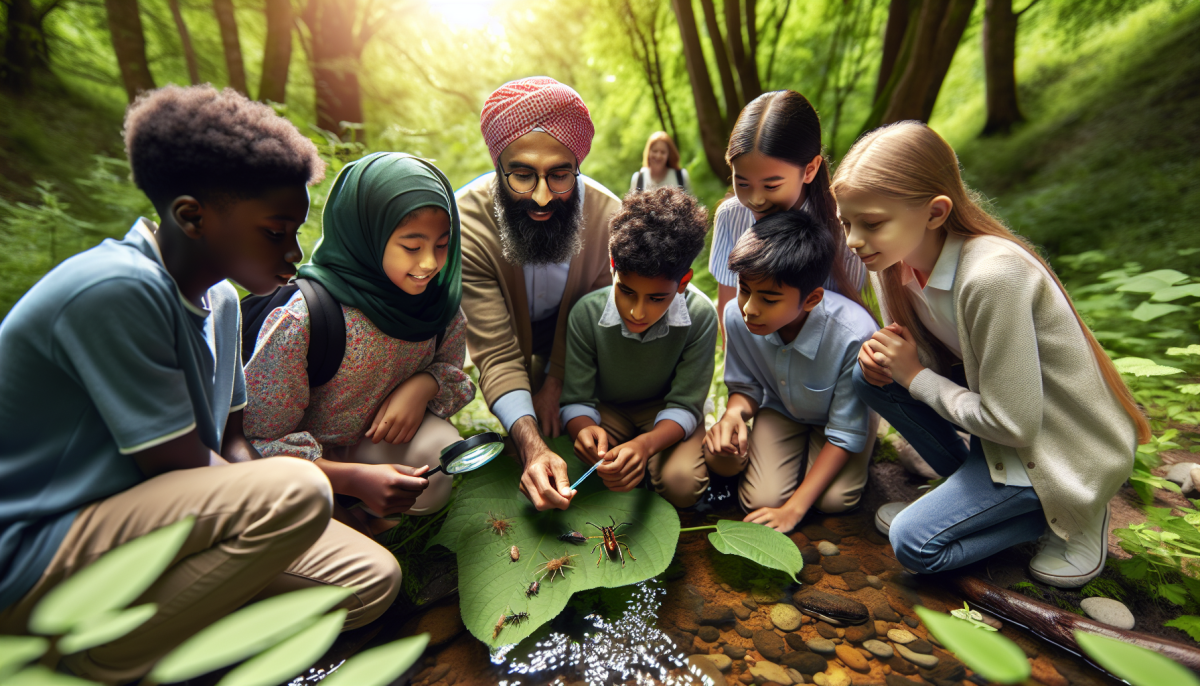Exploring the great outdoors is like opening a treasure chest of wonders for kids! Nature is full of surprises, and every trip outside can inspire questions and lead to new discoveries. Whether it’s spotting a colorful bird, identifying interesting plants, or watching clouds drift by, each moment sparks curiosity and encourages kids to learn more about the world around them.
When children spend time outdoors, they get to experience science and nature firsthand. Instead of just reading about ecosystems in a book, they can dig in the dirt, observe insects, and understand how everything is interconnected. This kind of hands-on learning creates lasting memories and helps them remember what they learned in a fun way.
Plus, exploring nature promotes critical thinking. Kids learn to ask questions like, “Why is the sky blue?” or “How do plants grow?” These questions lead to discussions, research, and even experiments, all of which help develop their problem-solving skills. It’s amazing how much kids can learn when they’re engaged in their surroundings!
Outdoor adventures also boost creativity. Kids can play make-believe in the backyard, transform sticks into swords, or build forts out of branches. Their imaginations can soar in open spaces. Encouraging free play outdoors allows kids to express themselves and come up with new ideas without the constraints of a classroom.
Hands-On Experiences Build Confidence and Skills
When kids dive into outdoor learning, they're not just soaking up knowledge; they're also building confidence and skills through hands-on experiences. Getting outside means they can explore, experiment, and discover in real-time. Whether it's planting a garden, hiking a trail, or studying insects up close, each activity offers a chance to learn by doing.
Think about it: when kids engage with nature, they're faced with challenges that require problem-solving. That could mean figuring out how to start a fire safely or finding the best way to cross a stream without getting wet. These little victories boost their confidence and give them a sense of accomplishment. Plus, they learn valuable life skills that textbooks can't teach.
Beyond just knowledge, outdoor learning encourages teamwork. Many activities involve group projects where kids must communicate and collaborate. This builds social skills and creates friendships as they share in the joys and challenges of exploring together. It’s all about working together to achieve a common goal, and that sense of community is invaluable.
Lastly, hands-on outdoor experiences help kids connect with their environment. They often become more aware of nature and develop a sense of responsibility towards it. It’s all about fostering a love for the outdoors and ensuring they understand how important it is to protect it for future generations.
Social Skills Grow Through Team Activities
One of the coolest things about outdoor learning is how it helps kids develop social skills through team activities. When children work together in nature, they naturally learn to communicate better and build friendships. Whether it’s a game of capture the flag or a cooperative building project, these experiences teach kids how to share ideas and listen to others.
Team activities often require kids to solve problems together. For example, they might need to figure out how to build a shelter using only natural materials. This kind of hands-on experience fosters teamwork and encourages kids to discuss their thoughts and opinions openly. It's amazing to see how quickly they pick up negotiation skills and learn the value of compromise.
Moreover, outdoor activities can help shy kids come out of their shells. Being in a relaxed environment allows them to feel more comfortable expressing themselves. As they participate in group challenges or games, they gain confidence in their ability to contribute to the team, which can have a positive impact on their overall social interactions.
Outdoor learning environments also provide opportunities for kids to experience both success and failure as a group. Celebrating victories together strengthens bonds, while navigating setbacks helps them learn resilience. These experiences are valuable for teaching empathy and understanding. Kids learn that everyone has different strengths and weaknesses, which is key to building lasting friendships.
Outdoor Learning Boosts Physical and Mental Health
Getting kids outside for learning is not just fun; it’s also great for their health! When children explore the outdoors, they get to run, jump, and play, which helps them stay physically fit. Fresh air and sunshine mean more Vitamin D, which is essential for strong bones and a healthy immune system. Plus, it burns off extra energy, making it easier for them to focus when they need to.
But it’s not just their bodies that benefit—being outdoors can really boost mental health too. Nature has a calming effect, helping to reduce stress and anxiety. Kids who spend time in green spaces often show better moods and can think more clearly. Being outside encourages curiosity and creativity, allowing children to explore and ask questions in a way that's simply not possible in a classroom.
Outdoor learning also fosters social skills. When children collaborate on projects or engage in group activities outside, they learn to communicate better, solve problems together, and build friendships. These interactions are important for developing teamwork and leadership skills that will be valuable for their futures.
Finally, outdoor spaces provide diverse experiences that stimulate all five senses—sight, sound, touch, smell, and even taste. This multisensory learning approach can make education more engaging and memorable. Kids are more likely to retain what they learn when they can feel the earth beneath their feet or hear the rustle of leaves in the wind.



